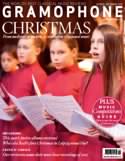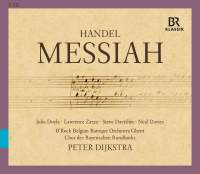Texte paru dans: / Appeared in: |
|
|
Outil de traduction (Très approximatif) |
|
|
Reviewer: David Vickers
In the last few years the Bavarian Radio Choir and its conductor Peter Dijkstra has notched up a selective discography of impressive live recordings of major Baroque choral masterworks, always with acclaimed period-instrument guest orchestras and top‑notch soloists. This new Messiah was recorded at several concerts in Munich in November 2014. Dijkstra prefers a traditional four-soloist version, featuring all the best music from numerous alternative variants, and his dependable direction combines many elements of historically informed performance practice with the best traditional choral qualities of contrapuntal flexibility and pious dignity. Organ is overused in arias (Handel probably reserved it for the choruses), but it often imparts a sense of solemn dignity without tempi actually dragging. Paradoxically, crisp harpsichord is often prominent in choruses. The Belgian orchestra B’Rock tone down the eccentricities evident in some of their previous Handel recordings under different leadership.
The Bavarian Radio Choir’s spotless English, dramatic intensity in powerful minor-key statements (‘Surely he hath borne our griefs’), polished shaping of lightly tripping fugal choruses (‘His yoke is easy’), and fulsome sonorities in the grand conclusions to Parts 2 and 3 (the splendid account of ‘Hallelujah’ features horns doubling an octave below the trumpets) make them a match for any number of topnotch British specialist choirs.
Julia Doyle sings ‘I know that my Redeemer liveth’ with affecting serenity. Lawrence Zazzo’s stylistic nous, dramatic fervour and impeccable diction mean that the words ‘For he is like a refiner’s fire’ have thrilling impact. Steve Davislim drops his ‘y’ in ‘Comfort ye, my people’ (so as to seem to invite us round for tea), but performs ‘Thy rebuke hath broken his heart’ with impeccable softness, whereas a bit of muscle is applied adeptly for ‘Thou shalt break them’. Neal Davies is suavely eloquent without bluster in ‘The trumpet shall sound’ (the use of organ in the middle section is cumbersome). On a few occasions overlong pregnant pauses between movements undermine the flow of the oratorio, but this sincere Messiah has plenty to offer. |
|
|
|
|
|
Cliquez l'un ou l'autre
bouton pour découvrir bien d'autres critiques de CD |
|




